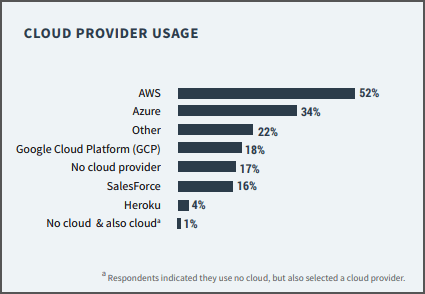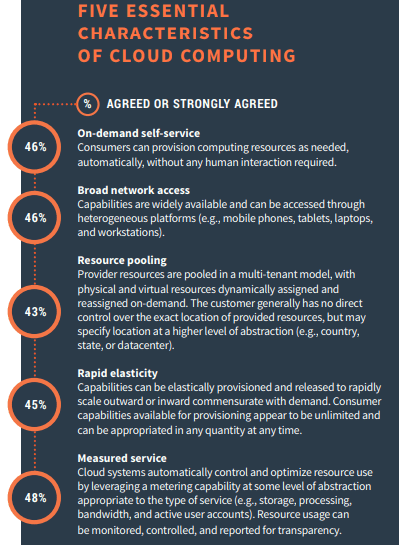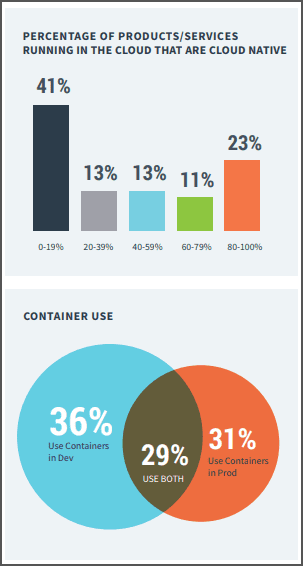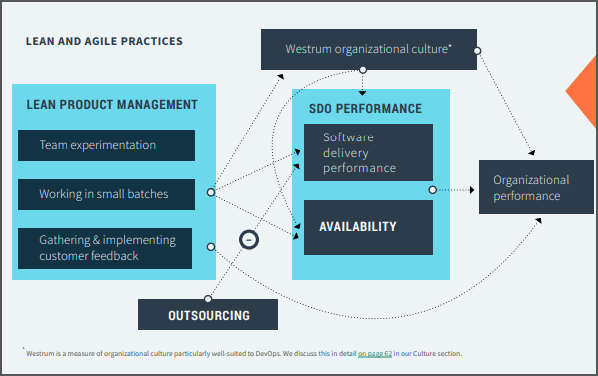DevOps industry continues to evolve and better itself, as adopting DevOps is not a choice for the organizations anymore, rather it is a competency that’s required to perform better. This and many other important assessments have been made by DORA (DevOps Research & Assessment) in its report, Accelerate: State of DevOps 2018: Strategies for a New Economy.
The 2018 state of DevOps report has linked software delivery and operational performance i.e. SDO performance with the organizational performance. It has been observed that strong software development (Dev) and software operations (Ops) along with cloud are the key drivers of successful software delivery, which is an important component in driving the performance up in every kind of organization, planning digital transformation.
The report has unlocked many new findings that will help businesses judge their software delivery strategies, improve quality of their IT teams, resource management and gain better productivity.
What differentiates elite teams from low performing ones?
Deployment and delivery of software in complex systems is a bit difficult. Teams who have the ability to develop and deliver software quickly are considered elite as they are better able to build ways of increased customer adoption and satisfaction, while keeping up with the regulatory demands and compliance too.
Thus, software delivery speed and operational performance act as the key differentiators for the teams because they enable organizations to utilize software to deliver improved outcomes.
Elite teams have more frequent code deployments, faster lead time from commit to deploy for the primary application, lower change failure rate and are fast to recover from incidents.
Elite teams have more likely superior and strong availability practices like:
- They keep promises and assertions about the software product or service, they are operating on.
- They ensure easy access of a product or service to the end users.
Not only this, elite teams also adopt best practices, while transforming their businesses digitally – adopt DevOps practices, implement cloud infrastructure, use open source software and adopt high-performance driving technical practices.
Let’s delve into these practices in detail.
6 key takeaways : best practices for an organization’s digital transformation journey
1. Implement DevOps practices and capabilities to drive organizational performance and quality outcomes
Organizations and teams who aim to embark on technology transformation journey have two important goals -organizational performance and quality outcomes. DORA research finds that software delivery performance and availability unlock competitive advantages like improved productivity, increased profitability, and market share as well as customer satisfaction while increasing the abilities that assist in organizational goals achievement.
Report states that those who implement DevOps practices do more value – added work. With more automation, DevOps using companies do less manual work, spend less time in fixing problems, reworking, remediations, and customer support. Above all this, they free their technical staff to do proactive or new work, in which they are able to design, build, and work on features, tests, and infrastructure, in a structured and productive way to create value for their organizations. Thus, they are able to develop, deliver and increase customer adoption and satisfaction.
2. Focus on the implementation of Cloud infrastructure, adopt essential patterns that matter
As per DORA survey, 67 % of the respondents were using some kind of cloud platform to host their primary application or service.

Source : DORA DevOps Report 2018
But, despite the huge amount of time and money spent by the organizations in cloud technologies’ implementation, they fail to leverage the capabilities provided by different cloud computing platforms.
Thus, doing cloud is not important, doing it right is important.
- Adopt essential characteristics of cloud computing
Report findings state that teams that adopt essential cloud characteristics are 23 times more likely to be elite performers.
On demand self-service, broad network access, resource pooling, rapid elasticity, and measured service are five essential characteristics of cloud computing that impacts software delivery performance.

Source : DORA DevOps Report 2018
- Implement PaaS (Platform as a Service) and use infrastructure as code
Organizations that use PaaS are 1.5 times more likely to be in the elite performance group.
DORA report states that libraries and infrastructure defined by PaaS can be used by the teams for application deployment into the on – demand cloud using a single step. They can perform self-service changes on-demand for databases and other services, as and when required by their applications.
Also, using infrastructure as code paradigm, helps to reproduce and change the state of environments in an automated fashion from information in version control and eliminates manual infrastructure configuration.
- Adopt cloud native design practices and use containers
Cloud native applications are designed around the constraints inherent to cloud systems, so cloud native applications must be resilient, elastic, easy to deploy and manage on-demand.

Source : DORA DevOps Report 2018
So, implement cloud native architectures, as those who implement cloud native architectures are 1.8 times more likely to be elite performers.
3. Avoid outsourcing as it hurts performance
There is no doubt that outsourcing by function provides flexibility and saves money, still it is rarely adopted by elite performers.
As per DevOps report, low-performing teams are 3.9 times more likely to use functional outsourcing (overall) than their elite performance counterparts, and 3.2 times more likely to use outsourcing for application development, IT operations work, or testing and QA.
4. Adopt best technical practices
Key practices that elite and high performers use essentially for successful technology transformations and in achieving SDO include monitoring, observability, continuous testing, database change management, and integrating security.
Other technical practices organizations should adopt include use of version control, deployment automation, continuous integration, trunk-based development, and a loosely coupled architecture.

Source : DORA DevOps Report 2018
5. Focus and adopt Lean and agile practices
Lean product management positively affects availability. Lean product management approaches help businesses get fast customer validation, which in turn enable them to respond quickly and integrate feedback timely. Below figure gives a glimpse of lean product management practices:

Source : DORA DevOps Report 2018
6. Influence organizational culture through autonomy, leadership and learning
Organizations should not ignore the importance of their people and culture during digital transformation. They should clearly communicate outcomes and goals to their teams and give them autonomy in their work as it leads to feelings of trust and understanding.
Also create climate for learning. Elite performers are 1.5 times more likely to consistently hold retrospectives and use them to improve their work. DORA report states that teams that leverage findings from retrospectives to implement changes to tooling, processes, or procedures see the strongest impacts.
So, build your business with autonomy, trust, learning, and information flow, this will help accelerate and improve profitability, productivity, and customer satisfaction.
Thus, CIOs should help their companies invest in smart software delivery processes and strategies to boost their digital transformation journey.
Source: https://cloudplatformonline.com/2018-state-of-devops.html









I think the admin of this web site is actually working hard
for his web page, since here every data is quality based information.